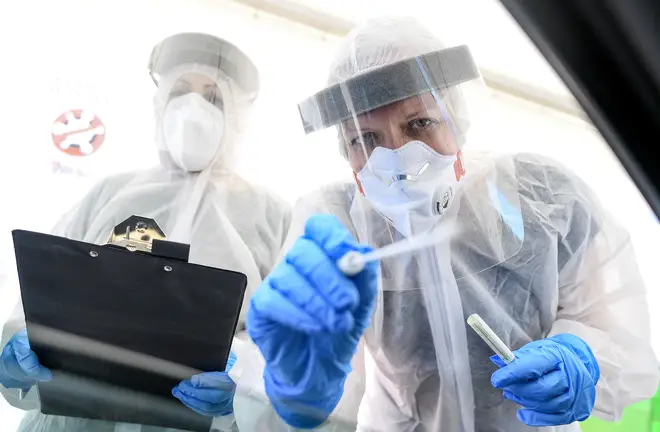
Dean Dunham 9pm - 10pm
26 April 2020, 10:30

A coronavirus vaccine might not be ready and available until "well into the next year," according to the former deputy chief medical officer for England.
Professor Gina Radford urged people to be "realistic" about the prospect of developing a vaccine for Covid-19 despite the government "throwing everything" at it.
It comes after the UK government announced a coronavirus vaccine taskforce at last Thursday's daily press conference from Downing Street.
The professor stressed the difficulty of "having to start from scratch" when developing a vaccine while speaking to Sky News' Sophie Ridge On Sunday show.
She said: "We haven't got a hugely good track record with vaccines for this particular virus, coronavirus, the family of viruses.
"But having said that everything is being thrown at it, there are researchers all over the world trying to identify a vaccine.
"We have never seen anything like the effort that is being put to discover this vaccine."
For all the latest coronavirus updates, follow our live blog here

Vaccine trials: Scientist explains how they work and when we can expect results
Earlier this month, a leading Oxford professor said a vaccine for the coronavirus could be made readily available to the general public by September.
Sarah Gilbert, a professor of vaccinology, said she was "80 per cent" confident a Covid-19 vaccine she and her team are working on would be successful.
She later clarified that nobody can guarantee or promise it is going to work and that the autumn time frame is "just about possible if everything goes perfectly."
Prof Radford expressed further caution regarding the swift development of a vaccine, saying there is a "huge process" of testing that needs to be undertaken to determine if potential vaccines are safe and effective.
She said: "I think those who are very used to the process of developing vaccines are saying they are not anticipating it being available until well into next year."
It comes after Health Secretary Matt Hancock said human trials for a coronavirus vaccine would begin in the last week.

Vaccine trialist feels "part of war effort" in act of resistance against Covid-19
The professor also believes lockdown measures being lifted in eventual stages.
She said: "They [the government] will be looking at what is going on in the rest of Europe and the rest of world, who are ahead of us in terms of the epidemic curve.
"We have seen, for example, what tends to happen is small businesses being opened first if they can safely socially distance.
"So whether we would look at different types of business, maybe also different parts of the country."
In regard to how schools could reopen, she said: "Maybe reduce the numbers in the class, maybe have some classes going back one week and other classes going back another week, and their schooling being supplemented by continuing with online classes."

Professor behind coronavirus vaccine explains what happens next with trials
Liberal Democrat acting leader Sir Ed Davey expressed concern that the government was not doing enough to enable the coronavirus lockdown to be eased.
"We have got to ensure that the testing, the tracing and indeed the isolation plan is in place," he told the Sky News programme.
"We are way behind on testing and we are not investing enough in tracing that we can really have a proper, community-led testing, tracing and isolation strategy."
Labour's Greater Manchester Mayor Andy Burnham has said there should be a "standards-led" easing of lockdown measures, with the Health and Safety Executive deciding whether businesses can put effective social distancing measures in place to reopen.
Listen & subscribe: Global Player | Apple Podcasts | Google Podcasts | Spotify
Mr Burnham said: "I worry that if we're going down the sectoral approach it could have heavy consequences for a city like Manchester, or say Blackpool - a town that really depends on tourism and hospitality.
"So the impact of a sectoral approach could hit certain places hard, so what I'm saying to the Prime Minister is think about a standards-led approach and actually create a national recovery council because we all need to have a voice in this debate.
"And these decisions that you are about to take are crucial to the economy of the North West of England and we need to be in the room debating it with you."